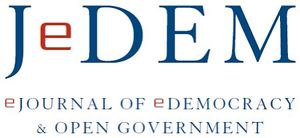Diferencia entre revisiones de «Derek Lackaff (2015) Escaping the Middleman Paradox: Better Reykjavik and Open Policy Innovation»
(Página creada con «URL: http://www.jedem.org/index.php/jedem/article/view/386 Wayback Machine: https://web.archive.org/web/20160710163713/http://www.jedem.org/index.php/jedem/article/view/38...») |
|||
| Línea 1: | Línea 1: | ||
| − | + | [[Archivo: jedem_compact.jpg | miniaturadeimagen | derecha]] | |
| − | + | == <small>'''Resumen'''</small> == | |
| + | Better Reykjavik is a unique municipal ePetition website that is developed and maintained by a grassroots nonprofit organization, has significant deliberative mechanisms, and has been normalized as an ongoing channel for citizen-government interaction across multiple elected administrations. The primary contribution of this study is an analysis of the novel “interface” that was established between the grassroots-developed technical system and the existing political and administrative institutions of policymaking. I begin with a brief overview of the challenges that citizens and governments face in the implementation of ePetition processes. I then suggest that Landemore’s (2012) “democratic reason” and Coleman’s (2008) “autonomous citizenship” constructs provide useful insights into why and how the Better Reykjavik has made a continuing impact on city governance. Next, I present an analysis of the socio-technical process of the initiative’s software development and political integration, showing how this project moved from the fringes of the grassroots towards the center of public and governmental awareness. I conclude by examining Reykjavik’s “new normal” political culture, which illustrates how a bottom-up, fast-moving technical initiative can productively support the slower-moving processes of democratic governance. | ||
| − | + | == <small>'''Palabras clave'''</small> == | |
| − | + | ePetitions; eDemocracy; eGovernance; crowdsourcing; cocreation; open innovation. | |
| + | |||
| + | == <small>'''Archivo'''</small> == | ||
| + | |||
| + | [[Archivo: escaping-the-middle-man-paradox.pdf]] | ||
| + | |||
| + | == <small>'''Fuente'''</small> == | ||
| + | |||
| + | [http://www.jedem.org/index.php/jedem/index JeDEM - eJournal of eDemocracy and Open Government] | ||
| + | |||
| + | == <small>'''Enlaces'''</small> == | ||
| − | + | '''URL:''' http://www.jedem.org/index.php/jedem/article/view/386 | |
| − | + | '''Wayback Machine:''' https://web.archive.org/web/20160710163713/http://www.jedem.org/index.php/jedem/article/view/386 | |
[[Categoría:Biblioteca]] | [[Categoría:Biblioteca]] | ||
Revisión del 22:29 17 abr 2017
Resumen
Better Reykjavik is a unique municipal ePetition website that is developed and maintained by a grassroots nonprofit organization, has significant deliberative mechanisms, and has been normalized as an ongoing channel for citizen-government interaction across multiple elected administrations. The primary contribution of this study is an analysis of the novel “interface” that was established between the grassroots-developed technical system and the existing political and administrative institutions of policymaking. I begin with a brief overview of the challenges that citizens and governments face in the implementation of ePetition processes. I then suggest that Landemore’s (2012) “democratic reason” and Coleman’s (2008) “autonomous citizenship” constructs provide useful insights into why and how the Better Reykjavik has made a continuing impact on city governance. Next, I present an analysis of the socio-technical process of the initiative’s software development and political integration, showing how this project moved from the fringes of the grassroots towards the center of public and governmental awareness. I conclude by examining Reykjavik’s “new normal” political culture, which illustrates how a bottom-up, fast-moving technical initiative can productively support the slower-moving processes of democratic governance.
Palabras clave
ePetitions; eDemocracy; eGovernance; crowdsourcing; cocreation; open innovation.
Archivo
Archivo:Escaping-the-middle-man-paradox.pdf
Fuente
JeDEM - eJournal of eDemocracy and Open Government
Enlaces
URL: http://www.jedem.org/index.php/jedem/article/view/386
Wayback Machine: https://web.archive.org/web/20160710163713/http://www.jedem.org/index.php/jedem/article/view/386
